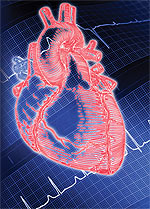 Research findings released this week indicate that men should worry about low testosterone levels. It could be responsible for more than just mood swings and a low sex drive.
Research findings released this week indicate that men should worry about low testosterone levels. It could be responsible for more than just mood swings and a low sex drive.
Low testosterone levels seem to be linked to a heightened risk of premature death from heart disease and all causes, suggests research published online in Heart journal.
This finding refutes previous research published on the subject, which had indicated that the hormone is a risk factor associated with cardiovascular disease.
The heart health of 930 men was tracked over 7 years, after each had been diagnosed with having coronary artery heart disease.
Low testosterone levels were fairly common in these men; one in four were also diagnosed as having clinically defined testosterone deficiency. This is known as hypogonadism and does not refer to men with declining levels of testosterone due to advancing age.
During the monitoring period almost twice as many men with low testosterone died as did those with normal levels. One in five (41) of those with low testosterone died, compared with one in eight (12%) of those with normal levels.
A clinically defined deficiency in testosterone was an independent risk factor for premature death from all causes and from heart disease, after taking account of other influential factors, such as age, other underlying health problems, smoking and weight
It was found that those men with a borderline- low level of testosterone were also at an increased risk of early death.
The authors have pointed out, while high doses of testosterone delivered by anabolic steroids are hazardous to the health, low rather than high testosterone levels are connected to a whole host of health problems, including obesity and insulin resistance – known risk factors for diabetes and heart disease.
The authors of the study, based at Royal Hallamshire Hospital in Sheffield, have concluded that men with hypogonadism (also at increased risk of the abovementioned conditions) could benefit from testosterone replacement.
A response to this study has highlighted the need for further research into the impact of testosterone on the health of both men and women. The impact or connection of testosterone levels on heart disease has largely taken a backseat, with researchers focusing on the impact of the female hormone Oestrogen until recently.
High testosterone has been linked to a variety of heath issues in women – including increased risk of developing diabetes and cardiovascular disease.
If you would like to read more about the impact of low and high testosterone levels you can take a look at the recently released research, links below.
Research http://press.psprings.co.uk/heart/october/hrt195412.pdf
Editorial response http://press.psprings.co.uk/heart/october/hrt207068.pdf

